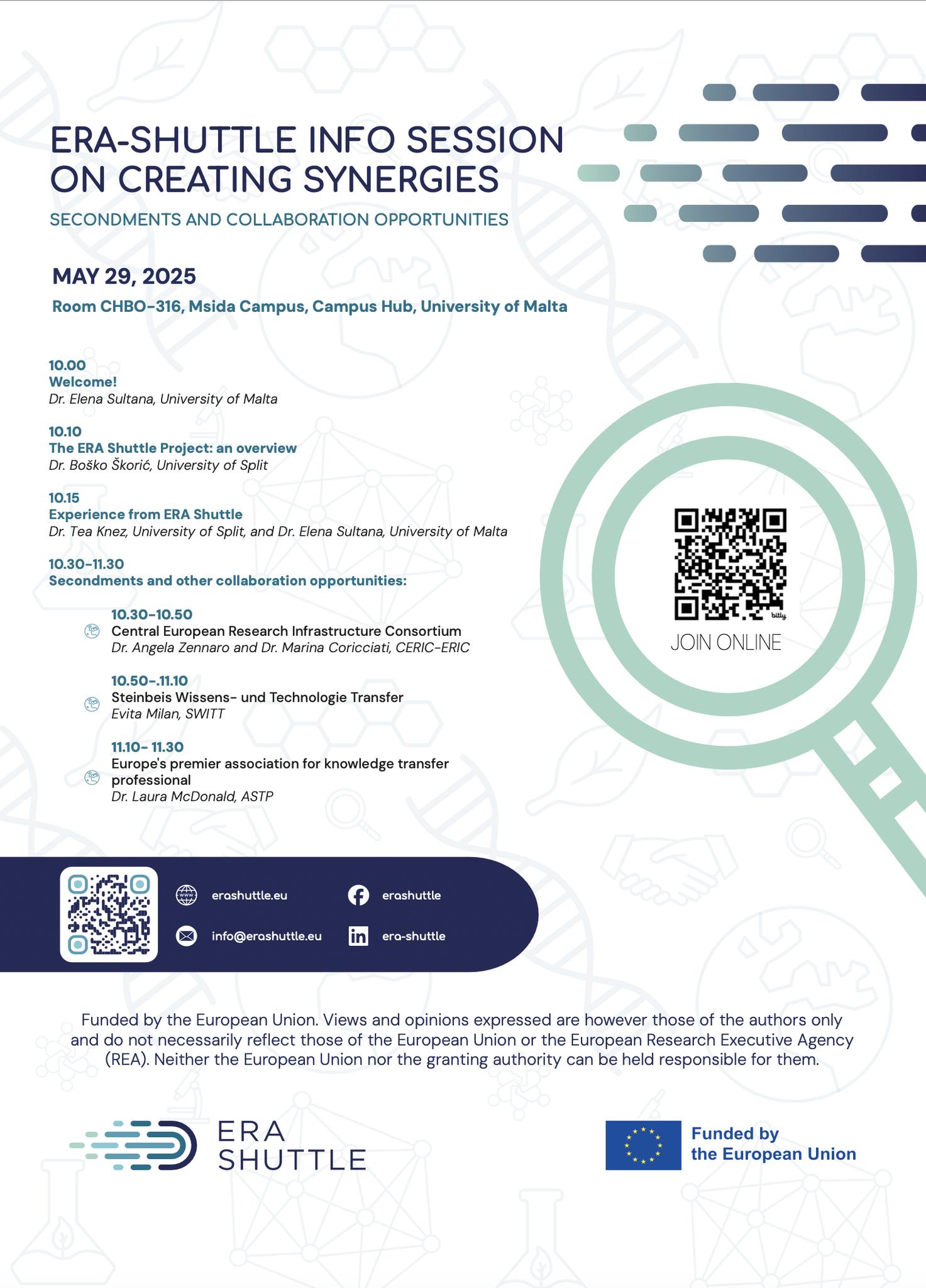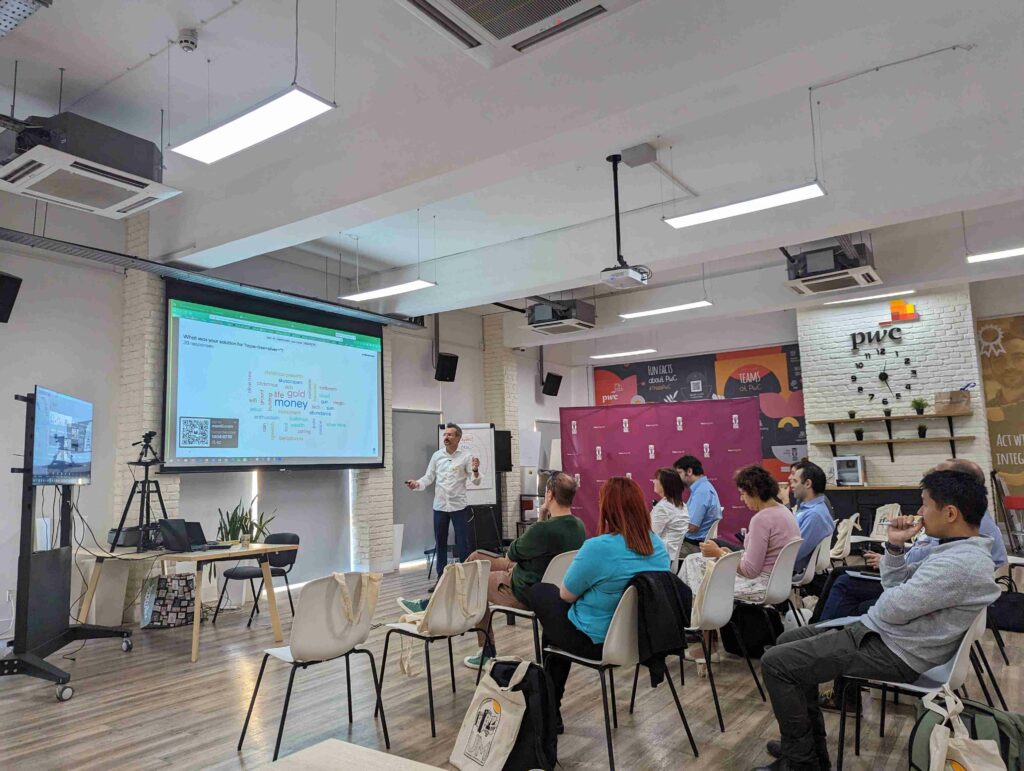Advancing Careers in Research and Innovation -
2nd Summer School in September 2025 at Gdańsk, Poland
The ERA SHUTTLE project is gearing up for the second of its three free Summer School sessions, taking place this time in Gdańsk, Poland. The event will be hosted by the University of Gdańsk from September 22nd to the 26th, 2025.
This training programme is tailored for researchers, research managers, and technology transfer officers who are looking to strengthen their career pathways in the field of research and innovation. Participants will explore topics such as soft skills development, AI productivity tools, research funding strategies, technology transfer, and innovation & entrepreneurship.
The Summer School is open to employees from the Universities of Split, Gdańsk, and Malta, with travel and subsistence covered for up to 5 selected participants from Malta and Split.
For full details, including the agenda and programme highlights, please see the official announcement below.
Registration Deadline: 28th August 2025
New QR Code update 🚨
A new QR code has been added to be able to join Thursday’s meeting virtually.
Click on the below link to join the meeting tomorrow and stay up to date with ERASHUTTLE’s ongoing plans! 🚀

ERA-Shuttle study visit to Berlin-Adlershof
Site visits and focus workshops on talent retention and innovation ecosystems
Coming Up Next – The ERA SHUTTLE project is running the first of the two planned study visits, in Germany’s Berlin-Adlershof Technology Park Berlin Adlershof – Science at Work – Germany‘s Leading Location for Research, Business and Media. The visit is hosted by ERA-Shuttle partner Steinbeis Wissens- und Technologietransfer GmbH Home from 2nd to 4th December 2024.
This is an invitation-only visit designed for research managers and high-level decision makers at our ERA-Shuttle academic partners and friends: the Universities of Split, Gdansk, Malta and Odessa. Participants will visit historical sites in Berlin-Adlershof, as well as two innovative research institutes: the Ferdinand-Braun-Institut (Leibnitz Institute for ultra-high-frequency research) and the Bundesanstalt für Materialforschung und -Prüfung (National materials testing office) BAM – Home .
On the first day, participants can expect presentations and a moderated discussion addressing talent retention – particularly as it relates to our ERA-Shuttle partner universities. Our invited speakers from the University of Split, WISTA Management GmbH, the University of Bologna and the Humboldt University of Berlin will give us food for thought.
On the afternoon of the second day, we open our programme to the public. Steinbeis will host and moderate speakers from the Ukrainian Academy of Sciences, University of Gdansk, WISTA Management GmbH, Steinbeis Wissens- und Technolgietransfer GmbH, CERIC-ERIC. Our focus will be on fostering innovation ecosystems in a southern- or eastern European context. If you are in Berlin on the afternoon of 3rd December, you are welcome to register for the public event here: Steinbeis Dialog@Adlershof
On the final day, it’s “just family”: ERA-Shuttle staff will use a world-café format to consolidate what we have learned ahead of the second study visit to Turku, planned for 2025 or 2026.

“Kopfbewegung” by Josefine Günschel and Margund Smolka, Photographed by OTFW Berlin, published under GNU Free Documentation License
Advancing Careers in Research and Innovation -
1st Summer School in September 2024 at UNIST, Split, Croatia
The ERA SHUTTLE project held the 1st of the 3 free Summer School sessions planned, starting in Split, Croatia. The summer school was hosted by the University of Split and took place from September 9th to 13th, 2024.
This program designed for researchers, research managers, and technology transfer officers to develop their careers in research and innovation. Participants could learn about soft skills, AI productivity tools, research funding, technology transfer, and innovation & entrepreneurship. The summer school was open to employees from the Universities of Split, Gdansk, and Malta, with travel and subsistence covered for the 5 selected participants from Gdansk and Malta.
For further information please view below where you can find the full announcement and agenda of the 5 day programme.
Registration Deadline closed – 24th July, 2024
Improving productivity and output quality of academics with AI tools
A workshop on the use of Artificial Intelligence (AI) for scientific writing was held between 21st and 22nd November 2023 at the University of Malta Common Room, as well as online. This occasion marked the first event of the ERA SHUTTLE project.
The workshop titled, “Scientists Need More! Next Level Productivity Using AI Assistants” was the first event of the project, and was hosted by Daniel Mertens, on behalf of the project partner Schiller & Mertens GbR.
Through an interactive approach, he engaged over 50 attendants who were both in-person as well as online attending through Zoom on the use of several AI tools to boost both the productivity by around 25% and quality of output by around 40%.
Following an introduction which demystified how generative AI tools such as ChatGPT operate, the attendants were made aware of the different strengths and weaknesses of different AI tools. Certain tools such as ChatGPT were noted to be better at generating content, however was not as adept at finding information, in that case tools use as Perplexity were more appropriate.
When it came to seeking out information required by scientific writers, then another set of tools (Elicit, Litmaps, Research Rabbit etc) were found to be more appropriate.
In addition to exploring the different tools, attendants were also taught how to prompt the AI in order to have it respond in the most efficient, direct and clear-as-possible manner. This made it possible to engage the AI in decision-making, by having it use methods such as ‘Second Order Effects’, or ‘Regret Minimisation Framework’ among others.
The workshop also explored different use cases for AI tools, such as its utility as a brainstorming companion, however, a number of risks were also discussed.
To date there continues to be the risk that certain AI tools have a tendency to ‘hallucinate’ and provide convincing information which could in fact be false. There also is also the risk that new and original information which is fed into the AI by a user can be regurgitated by the AI itself to another user who could be a competitor.
Therefore, attendants were taught to be prudent and cautious with how they make use of the tools to avoid using false information and to avoid losing confidential and proprietary information.
Workshop attendants were also given a crash course on how to use a mix of ChatGPT and Perplexity to create a programme in Python, and also use the tools to troubleshoot and solve errors that arise in the process, without having any prior experience in programming at all.
By the end of the workshop, effectively all of the attendants remarked that they will in some manner incorporate one or more of the AI tools which they learned during the two days. Many of the attendants even said they will use the knowledge to teach their peers and colleagues on how to get started, in order to facilitate both of their work.


